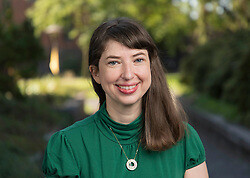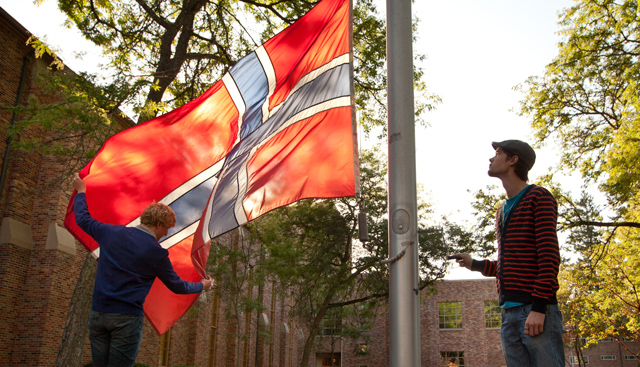Page 32 • (1,154 results in 0.014 seconds)
-

Dr. Laura Shneidman, Assistant Professor of Psychology (PLU), Dr. Rebekah Richert (PI, UC Riverside) and Dr. Elizabeth Davis (UC Riverside) have been awarded a five-year grant from the Templeton Foundation to join the Developing Belief Network. The network is a research initiative designed to bring…
Dr. Laura Shneidman awarded research grant from Templeton Foundation Posted by: tpotts / November 24, 2020 November 24, 2020 Dr. Laura Shneidman, Assistant Professor of Psychology (PLU), Dr. Rebekah Richert (PI, UC Riverside) and Dr. Elizabeth Davis (UC Riverside) have been awarded a five-year grant from the Templeton Foundation to join the Developing Belief Network. The network is a research initiative designed to bring together a network of scholars interested in cross-cultural study of the
-
This collection of African art is comprised of nearly 60 objects, many of which are on display in the Mortvedt Library, where a small exhibition space has been created in the stairwell leading to
nearly 30 cultural traditions. The LehmannsFind out more Between 1972 and 1992, Dr. J. Hans and Thelma Lehmann gave PLU 28 pieces of African art. In 2005, Thelma Lehmann gave one more piece (Boat with Warriors; accession no.2005-01-001) and promised additional pieces only if PLU had a place to display them. The CobbsFind out more In summer 2007, Dr. Oliver (Ollie) Cobb, a retired Seattle physician, approached PLU expressing the wish to give the university a piece of African art in memory of the
-
If you are interested in becoming a minor in anthropology, schedule an appointment with any member of the anthropology department and they will help you navigate the process.
MinorDeclaring a MinorIf you are interested in becoming a minor in anthropology, schedule an appointment with any member of the anthropology department and they will help you navigate the process.Requirements for a minor in Anthropology16 semester hours of class work in Anthropology including: ANTH 102 Introduction to Human Cultural Diversity ANTH 103 Introduction to Archaeology and World Prehistory OR ANTH 101 Introduction to Human Biological Diversity OR ANTH 104 Introduction to Language in
-
From our early history to our prospects for the future, China is part of Washington. Chinese people helped build and shape Washington–even before it was a state.
China in WashingtonFrom our early history to our prospects for the future, China is part of Washington. Chinese people helped build and shape Washington–even before it was a state. Stemming back two centuries, people of Chinese heritage came and were born in the Pacific Northwest. From railroad laborers to prominent business people to government leaders, thousands of people of Chinese heritage shaped our economy. The influx and interpretations of cultural traditions and the forging of civil
-
A. Department of Kinesiology B. Department of Marriage and Family Therapy C. School of Nursing D. Department of Social Work
Section 1. COLLEGE OF HEALTH PROFESSIONSA. Department of Kinesiology B. Department of Marriage and Family Therapy C. School of Nursing D. Department of Social WorkSection 2. COLLEGE OF LIBERAL STUDIESA. Department of Anthropology B. Department of Economics C. Department of English D. Department of Global and Cultural Studies E. Department of History F. Gender, Sexuality and Race Studies Program G. Holocaust & Genocide Studies Program H. Individualized Major I. Master of Fines Arts in Creative
-
Our Thirsty Planet The 2012 symposium addressed the theme of water - a resource we are over-exploiting and over-using and yet the very resource upon which we must depend to survive.
acknowledge with gratitude the generous financial support provided for the 2012 symposium by: The Thor Heyerdahl Institute, The Port of Tacoma, The Benson Family Foundation, The Scandinavian Cultural Center and The Norwegian Ministry of Foreign Affairs.
-
Click here if you’re interested in declaring a major in Religion! The B.A. in Religion requires 32 credit hours. Of these: At least 16 credit hours will be 300-level courses or RELI 495:
Bachelor of Arts degree in religion allows for flexibility: consult with the department chair to consider the best plan of study for you.Double-Majoring in ReligionConsider double-majoring in Religion, and see how students have brought their work in Religion into conversation with the natural sciences, social sciences, and the arts!What Does ``RC`` and ``RG`` Mean? Christian Traditions (RC) courses examine diverse forms of Christianity within their historical, cultural and political contexts. Global
-
Mark Mulder news for Pacific Lutheran University.
Alaska CEO Brad Tilden to Give Benson Lecture By Michael Halvorson, Benson Family Chair On Tuesday, October 17, 2017, in PLU’s Scandinavian Cultural Center (Anderson UC building), Alaska Airlines CEO Brad Tilden will engage with students, faculty, and community members in a lively conversation about the past, present, and future of Alaska Airlines.… October 3, 2017 Alaska AirlinesBenson LectureBrad TildenChung-Shing LeeMark MulderMichael HalvorsonNorthwest Business
-
22 semester hours completed with a grade of C- or higher
Harald Gaski and Britt Rajala (Sámi) visiting in 2013. Professor David Huelsbeck engages with students at the Makah Research and Cultural Center in Neah Bay. 2. Northwest Language and Worldview8 semester hours Students will take 8 semester hours that explore Indigenous language and worldviews of the Pacific Northwest. Equivalent coursework or demonstrated fluency to an equivalent level in another Indigenous language may be substituted for SOLU 101 and SOLU 102. SOLU 101: Southern Lushootseed
-

During a ceremony of remembrance in Red Square, the Norwegian Flag is raised for the victims of the terror attacks this summer. (Photo by John Froschauer) PLU professor remembers Norway’s peaceful response to attacks of terror By Katie Scaff ’13 The dignity and resolve of…
Berguson, associate professor of Norwegian and Scandinavian area studies, “the responses seemed natural and anything but naïve.” The Scandinavian Cultural Center and the Department of Languages and Literatures sponsored Berguson’s lecture, “My Little Country’: Norway’s Responses to Terror,” on Tuesday, Sept. 19, to honor the lives lost and provide insight into Norwegian responses to the acts of terror. “The summer became more than what any of us had imagined,” she said of the attacks. Berguson was in
Do you have any feedback for us? If so, feel free to use our Feedback Form.


